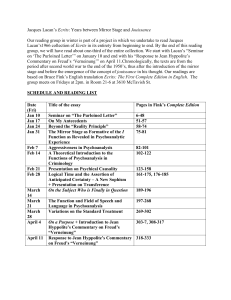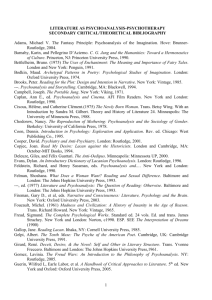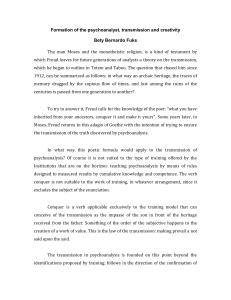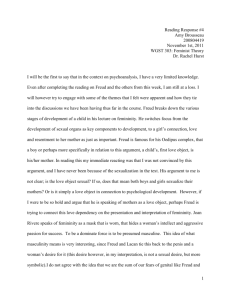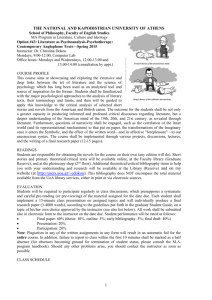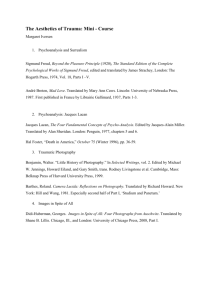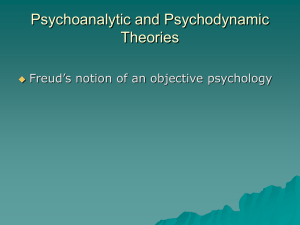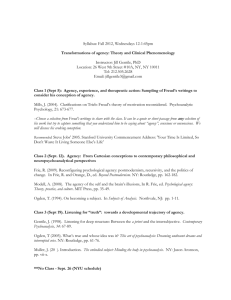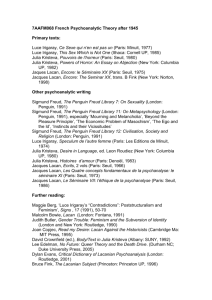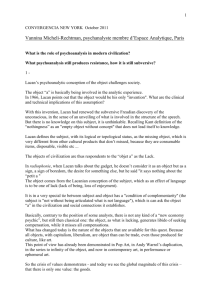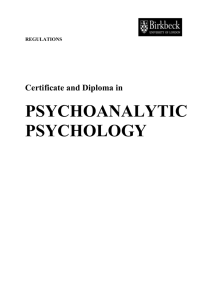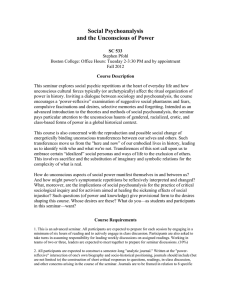THE NATIONAL AND KAPODISTRIAN UNIVERSITY OF ATHENS
advertisement
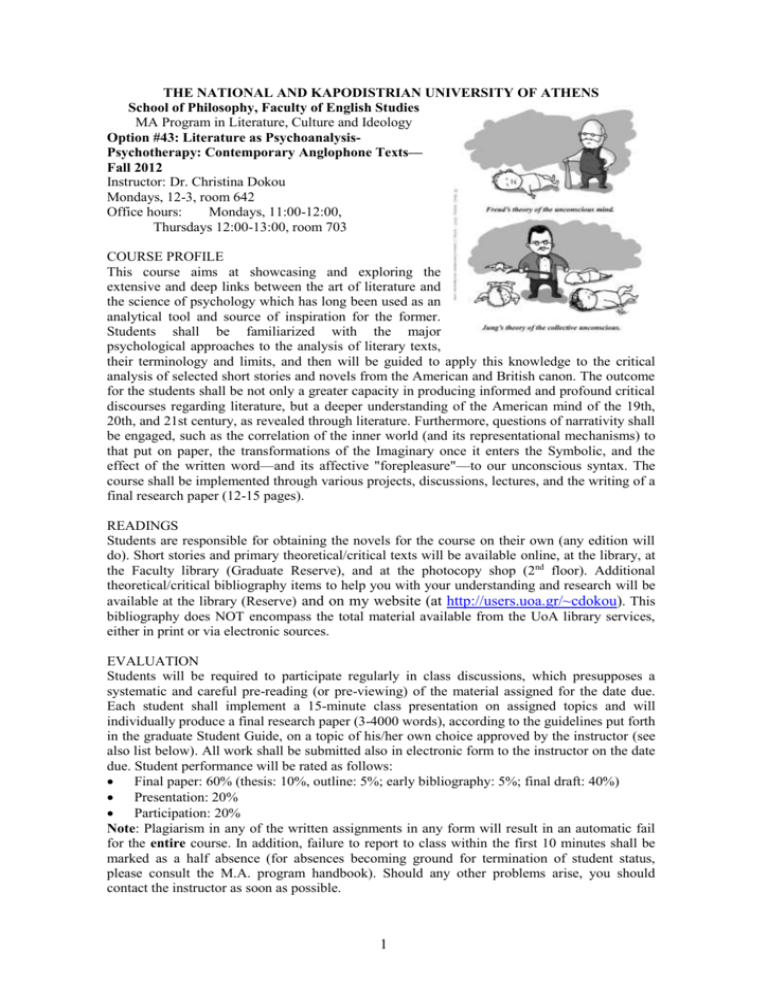
THE NATIONAL AND KAPODISTRIAN UNIVERSITY OF ATHENS School of Philosophy, Faculty of English Studies MA Program in Literature, Culture and Ideology Option #43: Literature as PsychoanalysisPsychotherapy: Contemporary Anglophone Texts— Fall 2012 Instructor: Dr. Christina Dokou Mondays, 12-3, room 642 Office hours: Mondays, 11:00-12:00, Thursdays 12:00-13:00, room 703 COURSE PROFILE This course aims at showcasing and exploring the extensive and deep links between the art of literature and the science of psychology which has long been used as an analytical tool and source of inspiration for the former. Students shall be familiarized with the major psychological approaches to the analysis of literary texts, their terminology and limits, and then will be guided to apply this knowledge to the critical analysis of selected short stories and novels from the American and British canon. The outcome for the students shall be not only a greater capacity in producing informed and profound critical discourses regarding literature, but a deeper understanding of the American mind of the 19th, 20th, and 21st century, as revealed through literature. Furthermore, questions of narrativity shall be engaged, such as the correlation of the inner world (and its representational mechanisms) to that put on paper, the transformations of the Imaginary once it enters the Symbolic, and the effect of the written word—and its affective "forepleasure"—to our unconscious syntax. The course shall be implemented through various projects, discussions, lectures, and the writing of a final research paper (12-15 pages). READINGS Students are responsible for obtaining the novels for the course on their own (any edition will do). Short stories and primary theoretical/critical texts will be available online, at the library, at the Faculty library (Graduate Reserve), and at the photocopy shop (2nd floor). Additional theoretical/critical bibliography items to help you with your understanding and research will be available at the library (Reserve) and on my website (at http://users.uoa.gr/~cdokou). This bibliography does NOT encompass the total material available from the UoA library services, either in print or via electronic sources. EVALUATION Students will be required to participate regularly in class discussions, which presupposes a systematic and careful pre-reading (or pre-viewing) of the material assigned for the date due. Each student shall implement a 15-minute class presentation on assigned topics and will individually produce a final research paper (3-4000 words), according to the guidelines put forth in the graduate Student Guide, on a topic of his/her own choice approved by the instructor (see also list below). All work shall be submitted also in electronic form to the instructor on the date due. Student performance will be rated as follows: Final paper: 60% (thesis: 10%, outline: 5%; early bibliography: 5%; final draft: 40%) Presentation: 20% Participation: 20% Note: Plagiarism in any of the written assignments in any form will result in an automatic fail for the entire course. In addition, failure to report to class within the first 10 minutes shall be marked as a half absence (for absences becoming ground for termination of student status, please consult the M.A. program handbook). Should any other problems arise, you should contact the instructor as soon as possible. 1 CLASS SCHEDULE (N) indicates that the text is available in the Norton Anthology of Theory and Criticism (available at the Library). Surnames in parentheses indicate the editors of the volumes where the photocopied theoretical articles are found DATE THEME READINGS DUE October 8 Introduction—Creative fantasies Thurber (preread online) and daydreaming October 15 Freudian Psychoanalysis Yalom, chapters 1-12; Freud, From The Interpretation of Dreams (N); “Psychoanalysis” from Character and Culture; all Freud excerpts from Lemert except “Oedipus the Child”; and “Creative Writers and Daydreaming” (Adams) Supplementary Hall, “Psychoanalytic Analysis: Overview”; Malpas, Overview of Freud (up Texts (optional) to p. 72); Freud, chapter II (Dream analysis example) from The Interpretation of Dreams; Felman, “The Dream from Which Psychoanalysis Proceeds” from What Does a Woman Want?; October 22 The dialectic method—narrative Yalom, chapters 13-end; Miller (un)consciousness (Lentricchia); Freud (Richter); Freud, chapters VI-VII and XIII from Character and Culture; Brooks (Richter); Trilling (Lodge) Supplementary Melzer, “Unconscious” (Lentricchia); Pateli, Georgilis (EnSign I); Texts Liakopoulou, Kontogiannakis, Stefanou (EnSign II) October 29 Psychiatric institutions—Jung Kesey, Part I; Jung (Lodge); “On the Relation…” (N); and “The Principal Archetypes” (Richter) Supplementary Jung-von Franz, chapters I and III from Man and His Symbols; Bettelheim, Texts from The Uses of Enchantment: The Meaning an Importance of Fairy Tales; Lianos, Lianou, Kollintza, Axiotelli (EnSign I) November 5 Cultural neurosis Kesey, Parts II-IV; American Psycho; Foucault, From Discipline and Punish (N); Freud, “The Uncanny” (N) Supplementary Tzilavi (EnSign I); Maniatopoulou, Daningeli (EnSign II) Texts November 12 Psychiatric institutions—Szasz Burroughs; Shaffer; Frye (N); Irigaray and the Anti-Oedipus question (Warhol); Freud from Civilization and Its Discontents Kaplan, “Introduction” November 19 Lacanian lack Malpas, pp.72-79; Lacan, “The Mirror Stage”; “The Instance of the Letter in the Unconscious” Supplementary Freud, from Jokes and Their Relation to the Unconscious; Winnberg, “The Texts Portrayal and Criticism of Existentialism in…American Psycho” November 26 Psychoanalytic literary Fineman (Feldstein); Lacan, “The Object criticism—Lacan Ophelia” (Felman); Belsey; Thesis choice due December 3 Feminist psychoanalysis Walker; Cixous, “Crime, Forgiveness”; Kristeva, From Powers of Horror Supplementary Jameson, “Imaginary and Symbolic in Lacan” (Kaplan); Cojec, from Read Texts My Desire: Lacan against the Historicists; Gallop, “Where to Begin” from Reading Lacan; Cixous-Clément, “Sorceress and Hysteric” from The Newly Born Woman 2 December 10 Supplementary Texts December 17 December 20 January 7, noon Fight Club; Kristeva, “The Semiotic and the Symbolic” (N); Kristeva from Desire in Language; Bibliography and outline draft due Foucault, from Madness and Civilization; Linden (Diamanti); Skouta, Louca (EnSign II); Kristeva, From Tales of Love Behaviorism—narrative A Clockwork Orange; Skinner, chapters 1conditioners 22 Student seminar: presentations: Room 821, 12:00-15:00 Final drafts due Does language suffer from Dissociative Personality Disorder? PRESENTATION ASSIGNMENTS: Students shall present a short, 12-15 minute version of their paper, complete with visual aids, at a mini-conference to be arranged as the 12 session of our course. Each presenter shall be graded a. on the content and effectiveness of their presentation (given that the other qualities of your argument shall be graded with the final paper), b. on the mechanics of the presentation itself, and c. on the feedback and response to questions elicited. PRIMARY TEXTS Kesey, Ken. One Flew Over the Cuckoo's Nest. London: Penguin, 1999. Shaffer, Peter. (1973) Equus. Penguin Plays. London: Penguin, 1977. Skinner, B. F. (1948) Walden Two. Reissued. Englewood Cliffs, NJ: Prentice Hall, 1976. Thurber, James. (1939) “The Secret Life of Walter Mitty”. WISP series. New York: Collins Design, 2006. (online) Yalom, Irvin D. When Nietzsche Wept. New York: Harper Perennial, 2005. Walker, Alice. Meridian. New York: Pocket Books, 1976. PRIMARY FILMS: American Psycho. Dir. Mary Harron (2000) Fight Club. Dir. David Fincher (1999) A Clockwork Orange. Dir. Stanley Kubrick (1971) Note: The three films are to be viewed by you independently and before the relevant class session. Should you have any problems obtaining a copy, please contact the instructor for help. SECONDARY LITERARY TEXTS (OPTIONAL) Auster, Paul. Man in the Dark. London: Faber and Faber, 2008. Ballard, J. G. (1973) Crash. London and New York: Harper Perennial, 2008. Carter, Angela. (1979) The Bloody Chamber and Other Stories. New York: Penguin, 1987. Doolittle, Hilda (HD). (1956) Trubute to Freud. New York: New Directions, 1984. Doxiadis, Apostolos. Logicomix. New York: Bloomsbury, 2009. Print. Ellison, Ralph. (1947) Invisible Man. New York: Vintage, 1995. Hemingway, Ernest. (1926) The Sun Also Rises. New York: Scribner, 2006. James, Henry. (1898) The Turn of the Screw. New York: Signet Classics, 2007. ---. (1881) The Portrait of a Lady. Penguin Classics Rev. ed. London: Penguin, 2003. Palahniuk, Chuck. (1999) Survivor. New York: Vintage, 2003. Roth, Philip. (1969) Portnoy’s Complaint. New York: Vintage, 1994. ---. The Breast. New York: Bantam, 1972. ---. (1987) The Counterlife. New York: Vintage, 1996. Steinbeck, John. (1937) Of Mice and Men. Steinback Centennial ed. New York: Penguin, 2002. Vonnegut, Kurt, Jr. Slaughterhouse Five. New York: Dell, 1968. Wallace, David Foster. (1999) “The Depressed Person.” Brief Interviews with Hideous Men. London: Abacus, 2009. 31-58. Weldon, Fay. (1993) Affliction. London: Flamingo, 1995. 3 Yalom, Irvin D. Love's Executioner: & Other Tales of Psychotherapy. New York: Harper Perennial Modern Classics, 2000. ---. (1999) Momma and the Meaning of Life: Tales of Psychotherapy. London: Piatkus, 2009. SECONDARY CRITICAL/THEORETICAL BIBLIOGRAPHY Adams, Michael V. The Fantasy Principle: Psychoanalysis of the Imagination. Hove: BrunnerRoutledge, 2004. Barnaby, Karin, and Pellegrino D’Acierno. C. G. Jung and the Humanities: Toward a Hermeneutics of Culture. Princeton, NJ: Princeton University Press, 1990. Bettlelheim, Bruno. (1975) The Uses of Enchantment: The Meaning and Importance of Fairy Tales. London and New York: Penguin, 1991. Bodkin, Maud. Archetypal Patterns in Poetry: Psychological Studies of Imagination. London: Oxford University Press, 1974. Brooks, Peter. Reading for the Plot: Design and Intention in Narrative. New York: Vintage, 1985. ---. Psychoanalysis and Storytelling. Cambridge, MA: Blackwell, 1994. Campbell, Joseph. The Portable Jung. New York: Viking, 1971. Caplan, Ann E., ed. Psychoanalysis and Cinema. AFI Film Readers. New York and London: Routledge, 1990. Cixous, Hélène, and Catherine Clément.(1975) The Newly Born Woman. Trans. Betsy Wing. With an Introduction by Sandra M. Gilbert. Theory and History of Literature 24. Minneapolis: The University of Minnesota Press, 1988. Chodorow, Nancy. The Reproduction of Mothering: Psychoanalysis and the Sociology of Gender. Berkeley: University of California Press, 1978. Coon, Dennis. Introduction in Psychology: Exploration and Application. Rev. ed. Chicago: West Publishing Co., 1995. Cooper, David. Psychiatry and Anti-Psychiatry. London: Routledge, 2001. Copjec, Joan. Read My Desire: Lacan against the Historicists. London and Cambridge, MA: OctoberMIT Books, 1994. Deleuze, Giles, and Félix Guattari. The Anti-Oedipus. Minneapolis: Minnessota UP, 2000. Evans, Dylan. An Introductory Dictionary of Lacanian Psychoanalysis. London: Routledge, 1996. Feldstein, Richard, and Henry Sussman, eds. Psychoanalysis and…. New York and London: Routledge, 1990. Felman, Shoshana. What Does a Woman Want? Reading and Sexual Difference. Baltimore and London: The Johns Hopkins University Press, 1993. ---, ed. (1977) Literature and Psychoanalysis: The Question of Reading: Otherwise. Baltimore and London: The Johns Hopkins University Press, 1993. Fireman, Gary D., et al, eds. Narrative and Consciousness: Literature, Psychology and the Brain. New York: Oxford University Press, 2003. Foucault, Michel. (1961) Madness and Civilization: A History of Insanity in the Age of Reason. Trans. Richard Howard. New York: Vintage, 1965. Freud, Sigmund. The Complete Psychological Works. Standard ed. 24 vols. Ed. and trans. James Strachey. New York and London: Norton, c1990. ESP. SEE The Interpretation of Dreams (1900) Gallop, Jane. Reading Lacan. Ithaka, NY: Cornell University Press, 1985. Gelpi, Albert. The Tenth Muse: The Psyche of the American Poet. Cambridge, UK: Cambridge University Press, 1991. Girard, René. Deceit, Desire, & the Novel: Self and Other in Literary Structure. Trans. Yvonne Freccero. Baltimore and London: The Johns Hopkins University Press,1961. Gomez, Lavinia. The Freud Wars: An Introduction to the Philosophy of Psychoanalysis. NY: Routledge, 2005. Guerin, Wlifred L, Earle Labor, et al. A Handbook of Critical Approaches to Literature. 5th ed. New York and Oxford: Oxford University Press, 2005. Hall, Calvin S., and Vernon J. Nordby. A Primer of Jungian Psychology. New American Library. New York: Mentor, 1973. Heller, Sharon. Freud A to Z. Hoboken, NJ: Wiley and Sons, 2005. 4 Hoffman, Frederick J. Freudianism and the Literary Mind. New York and London: Grove Press, 1957. Hogan, Patrick C. Cognitive Science, Literature, and the Arts: A Guide for Humanists. New York: Routledge, 2003. Holland, Norman N. Holland's Guide to Psychoanalytic Psychology and Literature-and-Psychology. New York: Oxford University Press, 1990. Homer, Sean. Jacques Lacan. Routledge Critical Thinkers. New York: Routledge, 2005. Hull, R. F., and William McGuire, eds. C. G. Jung Speaking: Interviews and Encounters. Princeton, NJ: Princeton University Press, 1978. Irigaray, Luce. (1977) This Sex Which Is Not One. Trans. Catherine Porter and Carolyn Burke. Ithaca, NY: Cornell University Press, 1985. ---. (1974). Speculum of the Other Woman. Trans. Gillian C. Gill. Ithaca, NY: Cornell University Press, 1985. Jones, Ernest. Hamlet and Oedipus: A Classic Study in the Psychoanalysis of Literature. New York: Doubleday Anchor, 1954. Jung, Carl Gustav, et al. Man and His Symbols. New York: Laurel, 1964. ---. Collected Works of C. G. Jung. Ed. Carrie Lee Rothgeb. Washington: DHEW, 1978. ---. The Undiscovered Self. Trans. R. F. C. Hull. New York: Mentor, 1958. ---. The Archetypes and the Collective Unconscious. Trans. F. C. Hull. London: Routledge, 1980. ---. The Structure and Dynamics of the Psyche. Trans. F. C. Hull. London: Routledge, 2000. Kiell, Norman. Psychoanalysis, Psychology, and Literature: A Bibliography. Lanham, MD: Scarecrow Press, 1990. Kristeva, Juia. Desire in Language: A Semiotic Approach to Literature and Art. Ed. and trans. Leon S. Roudiez. European Perspectives. New York: Columbia University Press, 1980. ---. (1980) Powers of Horror: An Essay on Abjection. Trans. Leon S. Roudiez. European Perspectives. New York: Columbia University Press, 1982. Lacan, Jacques. Écrits: The First Complete Edition in English. Trans. Bruce Fink. New York: Norton, 2007. Laing, R.D. The Divided Self: A Existential Study in Sanity and Madness. London: Penguin, 1990. Lahey, Benjamin B. Psychology: An Introduction. Dubuque: Brown & Benchmark, 1995. Lindauer, Martin S. Psyche and the Literary Muses: The Contribution of Literary Content to Scientific Psychology. John Benjamin’s Publishing Company, 2009. Mattoon, Mary Ann. Jungian Psychology in Perspective. New York: The Free Press, 1985. MacAfee, Noëlle. Julia Kristeva. London: Routledge, 2004. Neu, Jerome. The Cambridge Companion to Freud. New York: Cambridge University Press, 1991. Silverman, Kaja. The Subject of Semiotics. New York and Oxford: Oxford University Press, 1983. Szasz, Thomas S. The Myth of Mental Illness: Foundations of a Theory of Personal Conduct. NY: Harper Perennial, 1974. Von Franz, Marie-Louise. Archetypal Patterns in Fairy Tales. Studies in Jungian Psychology by Jungian Analysts 76. Toronto: Inner City Books, 1997. Wright, Elizabeth. Psychoanalytic Criticism: Theory in Practice. New York: Methuen, 1984. Žižek, Slavoj. Looking Awry: An Introduction to Jacques Lacan through Popular Culture. London and Cambridge, MA: October-MIT Books, 1991. ---. How to Read Lacan. NY: Norton, 2007. 5
